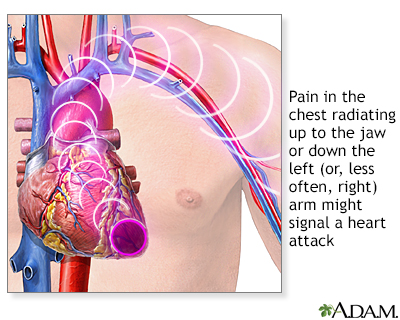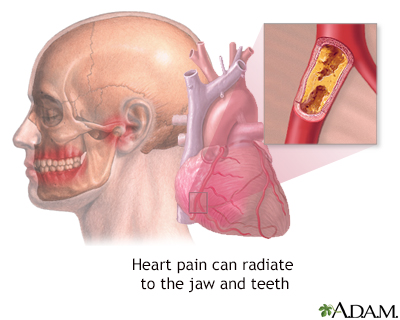Symptoms of Right Shoulder Pain Fatigue Shortness of Breath Funny Feeling in Lung or Heart
Chest pain
Chest tightness; Chest pressure; Chest discomfort
Chest pain is discomfort or pain that you feel anywhere along the front of your body between your neck and upper abdomen.

Symptoms of a possible heart attack include chest pain and pain that radiates down the shoulder and arm. Some people (older adults, people with diabetes, and women) may have little or no chest pain. Or, they may experience unusual symptoms (shortness of breath, fatigue, weakness). Women are more likely than men to have symptoms of nausea, vomiting, back or jaw pain, and shortness of breath with chest pain.

Pain from a heart attack may sometimes radiate to the jaw and teeth. Chest pain is a major symptom of heart attack, but other symptoms such as weakness, shortness of breath, nausea, or vomiting may also occur.
Considerations
Many people with chest pain fear a heart attack. However, there are many possible causes of chest pain. Some causes are not dangerous to your health, while other causes are serious and, in some cases, life-threatening.
Any organ or tissue in your chest can be the source of pain, including your heart, lungs, esophagus, muscles, ribs, tendons, or nerves. Pain may also spread to the chest from the neck, abdomen, and back.
When people have chest pain, they're often concerned they're having a heart attack. I'm Dr. Alan Greene and I'd like to talk to you for a moment about the different kinds of chest pain and when it may be an emergency. It turns out, there are lots of different kinds of chest pain. In fact, almost everything in the chest can hurt in one way or another. Some of the causes are really nothing more than a minor inconvenience. Some of them though are quite serious, even life threatening. You can have chest pain sure from the heart, but also from pneumonia. You can have chest pain from asthma. You can have chest pain from a blood clot in the lungs. It can be from nothing more than a strain of some of the muscles between the ribs, or nerves. You can also have chest pain that comes from acid reflux of from a stomach ulcer, gallstones. Many, many things can cause chest pain. You want to call 911 if you are having sudden, crushing chest pain or if your chest pain radiates into the jaw or the left arm. You want to call 911 if your chest pain also causes shortness of breath, or dizziness, nausea, or vomiting. You want to call 911 if you know you have heart disease and you do occasionally have pain but your pain is getting significantly worse than it is ordinarily. Or comes on with less activity than it does otherwise. But whatever the cause of chest pain, unless you're sure what's causing it, it's worth contacting your physician to find out what may be going on. It's not a symptom to ignore.
Causes
Heart or blood vessel problems that can cause chest pain:
- Angina or a heart attack. The most common symptom is chest pain that may feel like tightness, heavy pressure, squeezing, or crushing pain. The pain may spread to the arm, shoulder, jaw, or back.
- A tear in the wall of the aorta, the large blood vessel that takes blood from the heart to the rest of the body (aortic dissection) causes sudden, severe pain in the chest and upper back.
- Swelling (inflammation) in the sac that surrounds the heart (pericarditis) causes pain in the center part of the chest.
Lung problems that can cause chest pain:
- A blood clot in the lung (pulmonary embolism).
- Collapse of the lung (pneumothorax).
- Pneumonia causes a sharp chest pain that often gets worse when you take a deep breath or cough.
- Swelling of the lining around the lung (pleurisy) can cause chest pain that usually feels sharp, and often gets worse when you take a deep breath or cough.
Other causes of chest pain:
- Panic attack, which often occurs with fast breathing.
- Inflammation where the ribs join the breast bone or sternum (costochondritis).
- Shingles, which causes sharp, tingling pain on one side that stretches from the chest to the back, and may cause a rash.
- Strain of the muscles and tendons between the ribs.
Chest pain can also be due to the following digestive system problems:
- Spasms or narrowing of the esophagus (the tube that carries food from the mouth to the stomach)
- Gallstones cause pain that gets worse after a meal (most often a fatty meal).
- Heartburn or gastroesophageal reflux (GERD)
- Stomach ulcer or gastritis: Burning pain occurs if your stomach is empty and feels better when you eat food
In children, most chest pain is not caused by the heart.
Home Care
For most causes of chest pain, it is best to check with your health care provider before treating yourself at home.
When to Contact a Medical Professional
Call 911 or the local emergency number if:
- You have sudden crushing, squeezing, tightening, or pressure in your chest.
- Pain spreads (radiates) to your jaw, left arm, or between your shoulder blades.
- You have nausea, dizziness, sweating, a racing heart, or shortness of breath.
- You know you have angina and your chest discomfort is suddenly more intense, brought on by lighter activity, or lasts longer than usual.
- Your angina symptoms occur while you are at rest.
- You have sudden, sharp chest pain with shortness of breath, especially after a long trip, a stretch of bedrest (for example, following an operation), or other lack of movement, especially if one leg is swollen or more swollen than the other (this could be a blood clot, part of which has moved to the lungs).
- You have been diagnosed with a serious condition, such as heart attack or pulmonary embolism.
Your risk of having a heart attack is greater if:
- You have a family history of heart disease.
- You smoke, use cocaine, or are overweight.
- You have high cholesterol, high blood pressure, or diabetes.
- You already have heart disease.
Call your provider if:
- You have a fever or a cough that produces yellow-green phlegm.
- You have chest pain that is severe and does not go away.
- You are having problems swallowing.
- Chest pain lasts longer than 3 to 5 days.
What to Expect at Your Office Visit
Your provider may ask questions such as:
- Is the pain between the shoulder blades? Under the breast bone? Does the pain change location? Is it on one side only?
- How would you describe the pain? (severe, tearing or ripping, sharp, stabbing, burning, squeezing, tight, pressure-like, crushing, aching, dull, heavy)
- Does it begin suddenly? Does the pain occur at the same time each day?
- Does the pain get better or worse when you walk or change positions?
- Can you make the pain happen by pressing on a part of your chest?
- Is the pain getting worse? How long does the pain last?
- Does the pain go from your chest into your shoulder, arm, neck, jaw, or back?
- Is the pain worse when you are breathing deeply, coughing, eating, or bending?
- Is the pain worse when you are exercising? Is it better after you rest? Does it go away completely, or is there just less pain?
- Is the pain better after you take nitroglycerin medicine? After you eat or take antacids? After you belch?
- What other symptoms do you have?
The types of tests that are done depend on the cause of the pain, and what other medical problems or risk factors you have.
References
Amsterdam EA, Wenger NK, Brindis RG, et al. 2014 AHA/ACC guideline for the management of patients with non-ST-elevation acute coronary syndromes: a report of the American College of Cardiology/American Heart Association Task Force on Practice Guidelines. J Am Coll Cardiol. 2014;64(24):e139-e228. PMID: 25260718
Bonaca MP, Sabatine MS. Approach to the patient with chest pain. In: Zipes DP, Libby P, Bonow RO, Mann DL, Tomaselli GF, Braunwald E, eds. Braunwald's Heart Disease: A Textbook of Cardiovascular Medicine. 11th ed. Philadelphia, PA: Elsevier; 2019:chap 56.
Brown JE. Chest pain. In: Walls RM, Hockberger RS, Gausche-Hill M, eds. Rosen's Emergency Medicine: Concepts and Clinical Practice. 9th ed. Philadelphia, PA: Elsevier; 2018:chap 23.
Goldman L. Approach to the patient with possible cardiovascular disease. In: Goldman L, Schafer AI, eds. Goldman-Cecil Medicine. 26th ed. Philadelphia, PA: Elsevier; 2020:chap 45.
O'Gara PT, Kushner FG, Ascheim DD, et al. 2013 ACCF/AHA guideline for the management of ST-elevation myocardial infarction: a report of the American College of Cardiology Foundation/American Heart Association Task Force on Practice Guidelines. J Am Coll Cardiol. 2013;61(4):e78-e140. PMID: 23256914
Version Info
Last reviewed on: 7/7/2020
Reviewed by: Thomas S. Metkus, MD, Assistant Professor of Medicine and Surgery, Johns Hopkins University School of Medicine, Baltimore, MD. Also reviewed by David Zieve, MD, MHA, Medical Director, Brenda Conaway, Editorial Director, and the A.D.A.M. Editorial team.

Source: https://www.mountsinai.org/health-library/symptoms/chest-pain
0 Response to "Symptoms of Right Shoulder Pain Fatigue Shortness of Breath Funny Feeling in Lung or Heart"
Post a Comment